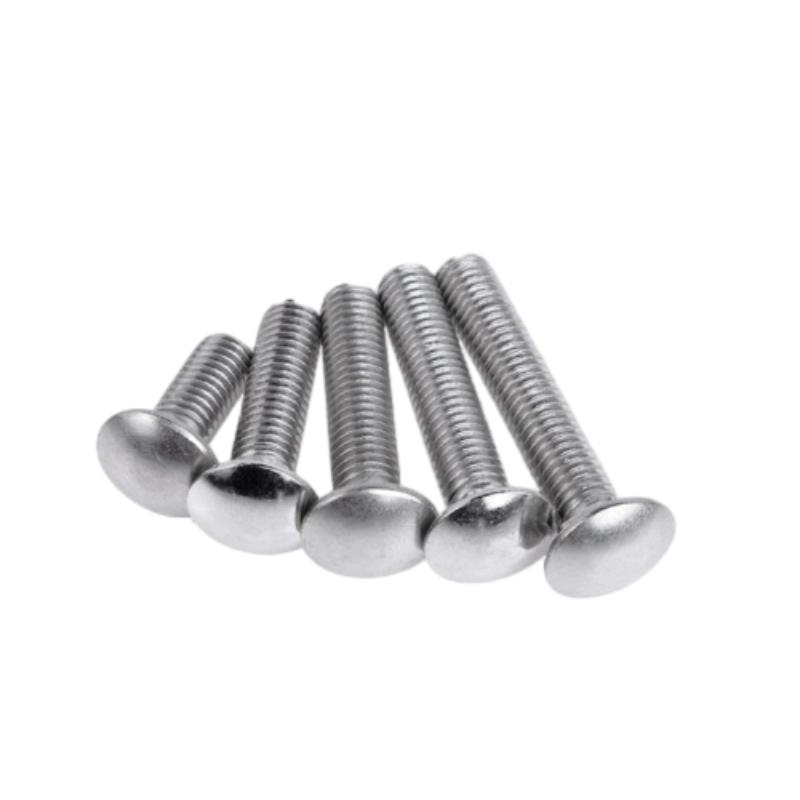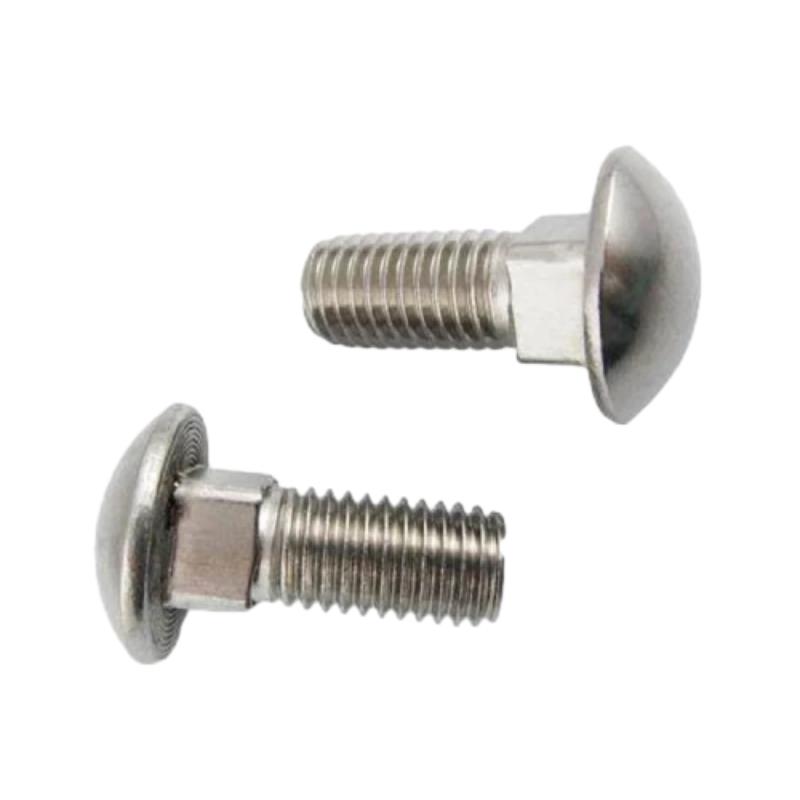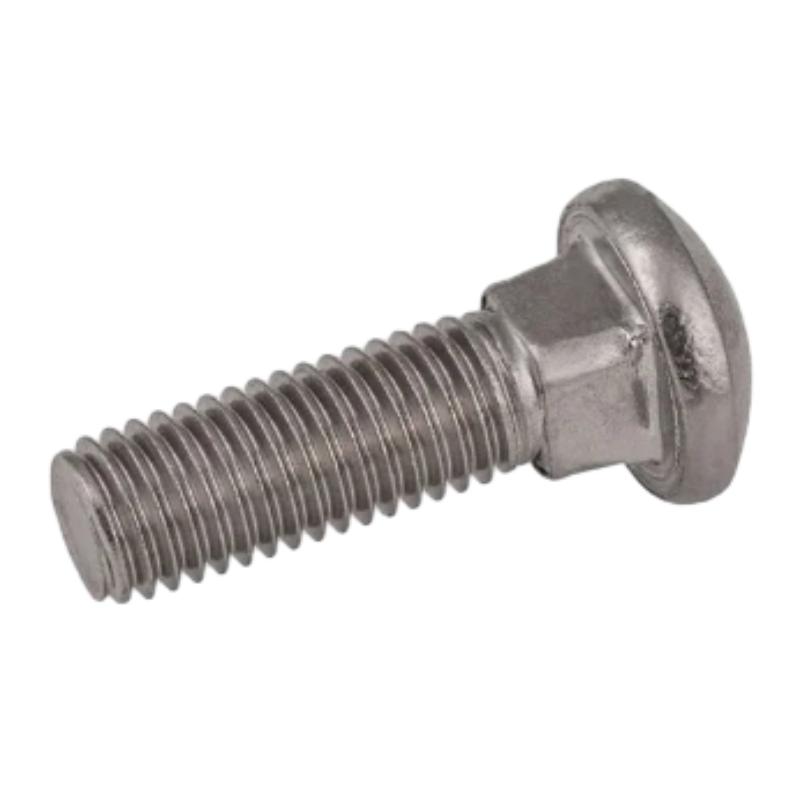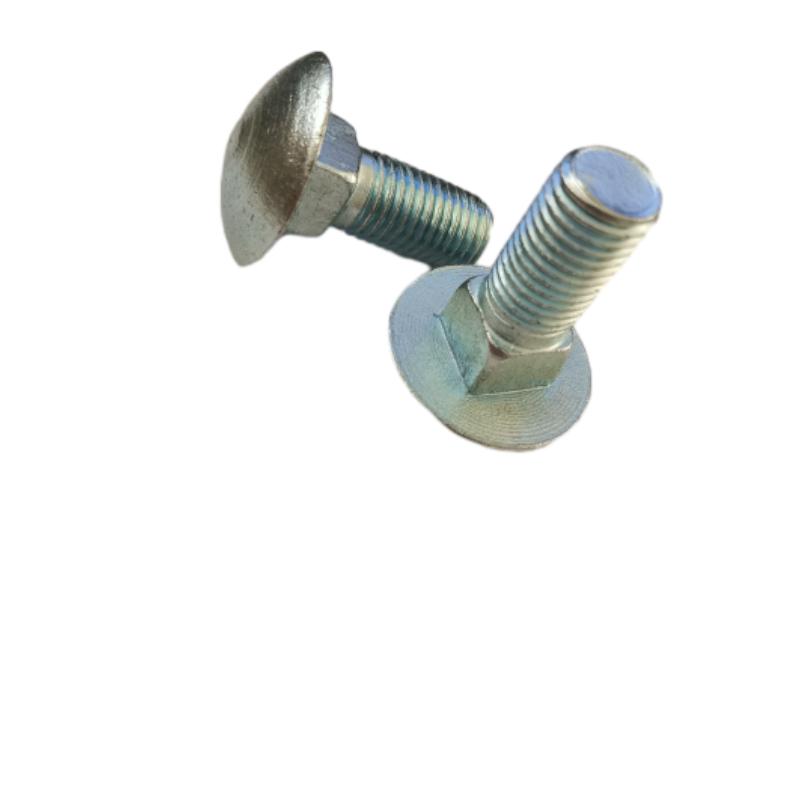Aug . 17, 2025 02:20 Back to list
High-Quality Carriage Bolts: Stainless Steel & Black Finishes
Understanding Carriage Bolts: Trends, Technology, and Applications
The industrial fasteners market is experiencing dynamic shifts, driven by advancements in materials science, manufacturing precision, and the increasing demand for durable, reliable components across diverse sectors. Among the myriad fastening solutions, carriage bolts, also widely known as coach bolts, stand out as essential elements for securing wood, metal, and composite materials in applications requiring a smooth, low-profile finish on one side. Their unique design, featuring a round head and a square neck underneath, prevents rotation when the nut is tightened, making them ideal for through-bolting where access to the head is limited. The global industrial fasteners market is projected to reach USD 117.8 billion by 2028, growing at a CAGR of 4.5% from 2021, with specific demand surges for specialized bolts like stainless steel carriage bolts and black carriage bolts due to their enhanced corrosion resistance and aesthetic properties. Key trends include the adoption of advanced coatings like galvanized white zinc for superior corrosion protection, increased demand for precision-engineered components, and a growing emphasis on sustainability and product longevity in sectors like renewable energy and infrastructure. This continuous evolution necessitates a deeper understanding of their technical parameters, manufacturing processes, and diverse application scenarios.
Our flagship product, the Factory Wholesale Carbon Steel Galvanized White Zinc M8X50 DIN603 Carriage Bolt, exemplifies these advancements. Engineered from high-grade carbon steel, it undergoes a meticulous galvanization process with white zinc, providing exceptional resistance against rust and environmental degradation. This specific M8X50 dimension, conforming to DIN 603 standards, signifies a nominal diameter of 8mm and a length of 50mm, making it a versatile choice for a broad spectrum of industrial applications. The flat, domed head of a flat head carriage bolt offers an aesthetically pleasing finish, preventing snagging and ensuring safety, particularly in construction and furniture assembly. Furthermore, the development of robust alloys and specialized coatings has significantly extended the service life of modern carriage bolts, reducing maintenance requirements and overall operational costs for large-scale projects. The shift towards higher strength-to-weight ratio materials and improved manufacturing efficiencies also contributes to the rising adoption of these fasteners in critical infrastructure and machinery, underpinning their role in modern engineering.
Precision Manufacturing & Stringent Quality Assurance
The manufacturing of high-quality carriage bolts involves a sophisticated multi-stage process designed to ensure dimensional accuracy, material integrity, and superior performance. Typically, the journey begins with high-carbon steel wire rods, which are fed into a cold heading machine. This process, a form of cold forging, shapes the wire into the distinctive round head and square neck under high pressure, without the application of heat. Cold heading enhances the mechanical properties of the steel, increasing its tensile strength and hardness, which is crucial for the fastener's load-bearing capabilities. Following heading, the bolt undergoes thread rolling, where dies are pressed onto the blank to form precise threads. Unlike thread cutting, thread rolling does not remove material but displaces it, further compacting the material and improving the thread's fatigue resistance and shear strength. This method significantly contributes to the overall durability and reliable engagement with carriage bolt washers and nuts.

Post-forming, our M8 carriage bolt, specifically the Galvanized White Zinc M8X50 DIN603 variant, proceeds to the galvanization stage. This involves a hot-dip galvanizing or electroplating process where a protective layer of zinc is applied. Electro-galvanizing, preferred for white zinc finishes, offers a smooth, bright appearance and a uniform coating thickness, providing excellent corrosion resistance. Each batch undergoes rigorous inspection protocols, including dimensional checks with calipers and gauges to ensure compliance with DIN 603 and ANSI standards for critical parameters like head diameter, square neck dimensions, thread pitch, and overall length. Mechanical property tests, such as tensile strength, proof load, and hardness tests, are conducted in accordance with ISO 898-1 standards to verify the bolt’s load-bearing capacity and resilience. Non-destructive testing methods may also be employed. This meticulous process ensures that our carriage bolts not only meet but exceed industry benchmarks for quality, reliability, and longevity, making them suitable for demanding environments in sectors like petrochemical and metallurgy where corrosive resistance is paramount.
Technical Specifications and Performance Metrics
Understanding the technical specifications of carriage bolts is crucial for engineers and procurement specialists to ensure optimal performance and safety in their designs. The DIN 603 standard, to which our M8X50 bolts conform, specifies the dimensions, mechanical properties, and material requirements for this type of fastener. For carbon steel grades, common strength classes include 4.6, 8.8, and 10.9, defining their tensile and yield strengths. Our galvanized white zinc carriage bolts typically meet or exceed property class 4.6, offering a minimum tensile strength of 400 MPa and a yield strength of 240 MPa. This robust profile makes them highly reliable for structural applications where moderate loads are expected. The galvanization process adds a protective layer, typically 5-15 microns thick for electro-galvanizing, which significantly extends the bolt's resistance to red rust in a salt spray test, often exceeding 72 hours, far surpassing untreated steel. This enhanced corrosion resistance makes them particularly suitable for outdoor applications and environments exposed to moisture or mild chemicals.

To provide a clearer picture of key parameters for various carriage bolts, including specific dimensions like those of a coach bolts M10 or tensile strength requirements for stainless carriage bolts, refer to the table below. This data is compiled from industry standards and typical product specifications, offering a comparative overview.
| Parameter | Typical Range/Value | Standard/Notes |
|---|---|---|
| Material Grades | Carbon Steel (4.6, 8.8), Stainless Steel (A2/304, A4/316) | DIN 603, ISO 898-1, ASTM F593 |
| Diameter Range | M5 to M20 (Metric), 1/4" to 3/4" (Imperial) | Common sizes, including M8 carriage bolt |
| Length Range | 20mm to 300mm (Metric), 1" to 12" (Imperial) | Specific to application, e.g., M8X50 |
| Tensile Strength (Carbon Steel 4.6) | Min. 400 MPa | ISO 898-1 Property Class 4.6 |
| Yield Strength (Carbon Steel 4.6) | Min. 240 MPa | ISO 898-1 Property Class 4.6 |
| Surface Treatment | Galvanized (White Zinc, Yellow Zinc), Black Oxide, Plain | Corrosion protection, appearance |
| Corrosion Resistance (Salt Spray Test) | 72-200 hours (White Zinc Galvanized) | ASTM B117 (for electroplated coatings) |
| Applicable Industries | Construction, Furniture, Marine, Automotive, Petrochemical, Energy | Versatile applications |
Versatile Applications and Strategic Advantages
The design efficacy of carriage bolts, particularly those manufactured to DIN 603 standards, makes them indispensable across a multitude of industries. In general construction, they are widely used for timber framing, deck building, and attaching metal plates to wooden structures, where their large, smooth head provides a flush, secure, and aesthetically pleasing finish, minimizing the risk of injury or snagging. In the furniture industry, they are integral for assembling wooden components, offering robust joints that withstand significant stress over time. Beyond these traditional uses, their unique non-rotational feature, facilitated by the square neck, makes them exceptionally reliable in applications where securing the bolt head is challenging or impossible, such as in fencing, playground equipment, and public seating. For instance, in outdoor infrastructure, the corrosion resistance of galvanized carriage bolts ensures longevity against weathering and environmental exposure, drastically reducing maintenance cycles and associated costs.

For specialized sectors like petrochemical, metallurgy, and water supply/drainage, the choice of materials and coatings becomes paramount. While standard carbon steel carriage bolts serve general purposes, high-performance variants such as stainless steel carriage bolts (e.g., A2/304 or A4/316 grades) are preferred in corrosive environments due to their inherent resistance to oxidation and chemical attack. Our Galvanized White Zinc M8X50 DIN603 carriage bolt, with its carbon steel base and protective zinc coating, offers an excellent balance of strength and corrosion resistance for demanding semi-corrosive or humid conditions. In water treatment facilities, for example, these bolts ensure secure assembly of pipes and equipment, preventing leaks and ensuring system integrity over extended operational periods. Similarly, in heavy machinery and automotive applications, the secure fastening provided by robust carriage screws minimizes vibration-induced loosening, contributing to equipment reliability and operational safety. This adaptability across various operating conditions underscores their value as a versatile fastening solution, directly contributing to enhanced structural integrity and reduced operational downtime.
Custom Solutions and Manufacturer Comparisons
While standard DIN 603 carriage bolts meet a wide range of needs, many industrial applications require custom solutions tailored to specific design constraints or environmental challenges. A reputable manufacturer offers extensive customization capabilities, including variations in material (e.g., higher carbon steel grades, different stainless steel alloys), specialized coatings (e.g., black oxide for aesthetic and mild corrosion resistance, hot-dip galvanizing for harsh outdoor environments), and unique dimensions beyond standard M8X50, such as extra-long shafts or specialized head designs. For instance, a project requiring enhanced aesthetics might opt for black carriage bolts, while marine applications would invariably demand stainless carriage bolts (316 grade) for their superior resistance to saltwater corrosion. Customization also extends to thread types, such as fine-pitch threads for precision adjustments, and even packaging solutions optimized for automated assembly lines. Our expertise allows us to engineer solutions that precisely match client requirements, ensuring optimal performance and cost-efficiency.

When evaluating manufacturers of carriage bolts, several critical factors should be considered beyond just price. Quality certifications, such as ISO 9001, attest to a manufacturer's commitment to quality management systems, ensuring consistent product standards. Experience and longevity in the industry are also strong indicators of reliability and expertise. Manufacturers with robust R&D capabilities can offer innovative solutions and adapt to evolving industry demands, for instance, developing new coatings for extreme temperature applications or higher-strength materials for heavy-duty structural work. Furthermore, a manufacturer's supply chain efficiency and global distribution network are crucial for ensuring timely delivery and cost-effectiveness, particularly for large-volume orders. Unlike smaller suppliers, established manufacturers often have the capacity for comprehensive material traceability and batch testing, providing an unparalleled level of trustworthiness and compliance with stringent industry regulations. Our commitment to these principles ensures that every carriage bolt we produce meets the highest benchmarks for quality, performance, and customer satisfaction.
Ensuring Trustworthiness: FAQ, Delivery, and Warranty
Building trust with B2B clients extends beyond product quality to encompass comprehensive support, transparent processes, and robust assurances. Our commitment to trustworthiness is reflected in our detailed FAQ module, which addresses common inquiries regarding our carriage bolts, their specifications, applications, and compatibility. Questions like "What is the typical service life of a galvanized carriage bolt in outdoor conditions?" or "Are these bolts compatible with standard metric nuts and carriage bolt washers?" are frequently asked and thoroughly answered to empower our clients with necessary information for informed decision-making. We also provide clear and concise information regarding our delivery cycle. For standard orders of our Factory Wholesale Carbon Steel Galvanized White Zinc M8X50 DIN603 Carriage Bolt, typical lead times range from 7 to 14 business days, depending on order volume and specific customization requirements, with expedited options available for urgent needs. Our logistics team works diligently to ensure timely and secure shipments, minimizing downtime for your projects.
Furthermore, we stand by the quality of our carriage bolts with a comprehensive product warranty, typically covering defects in material and workmanship for a period of one year from the date of purchase. This warranty underscores our confidence in our manufacturing processes and the durability of our fasteners. In the unlikely event of an issue, our dedicated customer support team is readily available to provide assistance, troubleshoot problems, and facilitate prompt resolutions. Our technical experts can guide clients through selection, application, and maintenance best practices, ensuring optimal performance and longevity for their fastening solutions. This holistic approach to client support, coupled with our adherence to international standards like ISO 9001 and strict quality control, solidifies our position as a reliable and authoritative partner in the industrial fastener supply chain. We believe that transparent communication, unwavering support, and clear commitments are fundamental to fostering long-term, successful partnerships, particularly when dealing with critical components like carriage bolts that are integral to structural integrity and operational safety.
Frequently Asked Questions (FAQ)
-
Q: What is the primary advantage of a square neck on a carriage bolt?
A: The square neck is designed to seat into a pre-drilled square hole in wood or soft metal, preventing the bolt from turning when the nut is tightened. This allows for tightening from one side without needing to hold the head. -
Q: Can your M8X50 DIN603 carriage bolts be used in marine environments?
A: While our galvanized white zinc bolts offer good corrosion resistance, for continuous exposure to saltwater or harsh marine environments, we recommend stainless steel carriage bolts (A4/316 grade) due to their superior chemical resistance. -
Q: What is the typical lead time for custom carriage bolt orders?
A: Custom orders typically have a lead time of 3-5 weeks, depending on complexity, material availability, and order volume. Please contact our sales team for a precise estimate based on your specific requirements. -
Q: Do you provide certification of compliance for your fasteners?
A: Yes, we provide Material Test Certificates (MTCs) and Certificates of Conformance (CoCs) for all our fasteners, ensuring traceability and adherence to relevant international standards like ISO, DIN, and ANSI.
Authoritative References
- International Organization for Standardization. ISO 898-1: Mechanical properties of fasteners made of carbon steel and alloy steel - Part 1: Bolts, screws and studs with specified property classes - Coarse thread and fine pitch thread.
- Deutsches Institut für Normung. DIN 603: Coach bolts with mushroom head and square neck.
- American Society for Testing and Materials. ASTM B117: Standard Practice for Operating Salt Spray (Fog) Apparatus.
- Grand View Research. Industrial Fasteners Market Size, Share & Trends Analysis Report By Product, By Material, By Application, By Region, And Segment Forecasts, 2021 - 2028.
- The Fastener Technology International Journal. Advances in Fastener Coating Technologies for Enhanced Corrosion Resistance.


